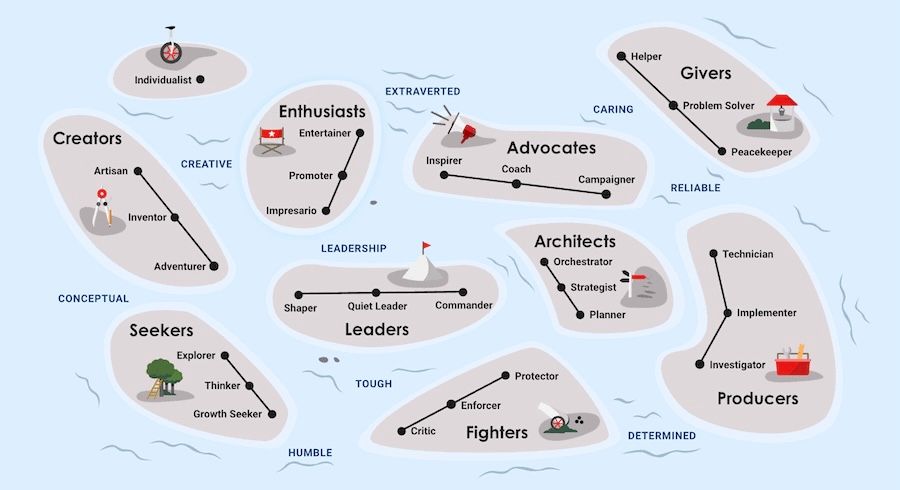PrinciplesYou

PrinciplesYou is essentially a free and more comprehensive version of the Myers-Briggs Type Indicator (MBTI). It takes nearly an hour to complete the questionnaire, but I think the results are worthwhile and I would strongly encourage anyone to complete it.
In this post, I'll share my own archetype, what I think it means, and how I think it could be relevant to my decision-making.

While I don't think the results were surprising, I definitely appreciated how they provide data-driven support for what I probably knew deep down to be true. I have always loved to learn, explore, and work on ideas rather than spend time on optimization.
The interesting insights are in the attribute breakdowns:

- I like to think and do things my own way. (I'd rather be original and get a B than copy a popular method and get an A.)
- I'm very unreliable, and my natural inclination is to procrastinate. I don't like to get bogged down in the details and dislike having too many items in my schedule.
- I prefer straightforward things I can see and touch, and I avoid abstract ideas. This explains why I really disliked advanced mathematics despite being quite good at pre-calculus math.

- I love to be alone. I used to be very introverted, but have become more extraverted over the years. Nowadays, I'm comfortable having one-on-one conversations with most people.
- I'm extremely direct and straightforward with others. If I need to take charge of a high stakes project, I can be very demanding.
- I'm interested in others, but I'm not so sensitive to their feelings/emotions.

- I value autonomy and flexibility extremely highly. In fact, I do my best to prioritize these two aspects whenever I need to make a decision.
- I'm normally composed because I'm not emotionally attached to most outcomes and don't have a desire to control others. However, I've found that I can lose my composure completely if my autonomy is taken from me or if I need to influence something that I have little to no control over.
- I tend to lose interest/motivation, though I usually commit to finishing what I start. For example, I successfully learned to code but I haven't done anything with it. I think I'll also finish my 100-day challenge with this blog, but upon completing it I plan to revert to a once-a-week posting schedule.
- I thought I'd classify as extremely lazy, but it seems that I'm average in this regard. Or maybe it's just that most people are lazy too.
I think the above results are useful because they clearly indicate what my preferences are. While I may already know most of this, having it presented in a systematic way has been extremely helpful.
For example, I now know that I would make a below-average entrepreneur. I have low levels of determination (which is the most important trait in a startup founder) and average energy levels, and I'm unreliable.
I'm also not born to be a coach, mentor, or problem-solver. While I think I have high levels of empathy and a lot of experience in certain areas, I'm ultimately self-centric and consciously avoid getting caught up in others' feelings/emotions. This makes me seem uncaring, which is admittedly true in most cases.
In the context of how these findings might affect my decision-making:
- It's yet more evidence that I should quit my current line of work.
- If I ever start something (eg. a bookstore), it should be through the lens of learning something or creating something new rather than profit maximization.
- Whenever I'm unsure about what to do with my time, I should travel and/or explore something new.




